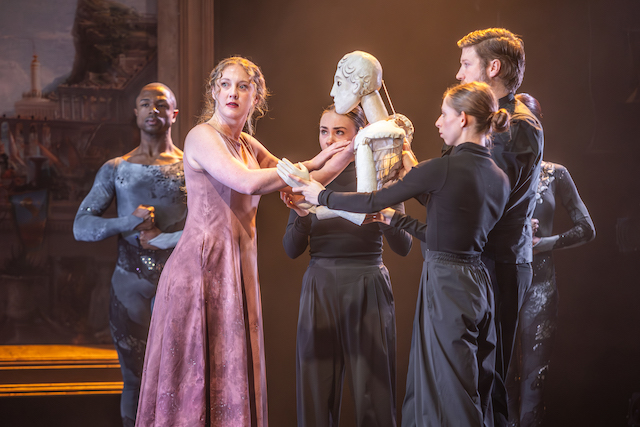Over the last three years of the London Handel Festival, two experimental productions have proved to be highlights – not just of the festival itself – but of the musical year. In 2023, Adele Thomas’s In The Realms of Sorrow brought sweat, muscularity and subversion to four of Handel’s early cantatas with stunning effect. In 2024, Aci by the River introduced a darkly witty take from director Jack Furness, transporting us up the Thames and on to a film set where the Cyclops was incarnated as a tyrannical Italian film director.
But it’s the nature of creative experiment that while sometimes you create something wonderful and new, other times you just break some eggs. Despite some fascinating elements, this year’s Tales of Apollo and Hercules is one of those latter instances. Director Thomas Guthrie has brought together two cantatas that Handel wrote forty years apart on the basis that Apollo and Hercules were half-brothers. That’s an appealing idea in itself but the substance of the cantatas is so different that the effect of putting them together doesn’t seem to carry an emotional logic. In the first, Apollo e Dafne, inspired by Ovid’s Metamorphoses, a randy god pursues a nymph who escapes by being turned into a tree, in the second, The Choice of Hercules, a wide-eyed boy must select either virtue or pleasure.
True, Handel builds on Ovid’s story by giving Dafne a voice, so that rather than simply fleeing Apollo, she also presents him with a choice between virtuous restraint and morally dubious pleasure. Yet the dynamic of the two stories is utterly different – shifting from the X-rated to the pedagogic. What’s more, Guthrie emphasises the distance between the two tales by staging Apollo e Dafne in Fifties Mad Men costumes and The Choice of Hercules in neoclassical wear. Beyond this, ballet dancers in mottled grey costumes – which I presumed were meant to resemble the bark of trees – act out the multiple subtexts of each cantata. When this works – which it does during a couple of the disputes between Apollo and Dafne – it can be thrilling, but too often, though the dancing is never less than beautiful, it feels like an irritating distraction.
Happily the music, performed by La Nuova Musica and directed by David Bates, is superb throughout. The shiver of the violins as the action begins for Apollo e Dafne instantly injects drama. As Dan D’Souza’s pin-striped, Don Draper-style Apollo strides complacently onto the stage, the piercing lament from the oboe suggests that his vanity will soon be shattered. It brings a nice moment of dramatic irony, as D’Souza resonantly declaims – his voice shimmering with self-satisfaction – that the world owes him its happiness following his slaying of the monstrous Python at Delphi. There’s a beguiling shift in mood as Lauren Lodge-Campbell’s Dafne appears on a balcony above the stage and sings The happiest souls are free, accompanied by a flute and strings playing soft pizzicato. Her supple voice soars easily to the highest notes in this classically Handelian declaration of independent womanhood. D’Souza’s Apollo is winningly repulsive when he chauvinistically taunts her that her beauty will not live for ever, but the effect is sadly undercut by a male dancer dancing around him, comedically doubtful, with his chin in his hand. Is he commenting on Apollo? Or is he Apollo’s subconscious? With such wit and beauty in the music itself, the only certainty is that he takes away from, rather than heightening, what we are seeing.
There’s a beguiling shift in mood as Lauren Lodge-Campbell’s Dafne appears on a balcony above the stage and sings The happiest souls are free, accompanied by a flute and strings playing soft pizzicato. Her supple voice soars easily to the highest notes in this classically Handelian declaration of independent womanhood. D’Souza’s Apollo is winningly repulsive when he chauvinistically taunts her that her beauty will not live for ever, but the effect is sadly undercut by a male dancer dancing around him, comedically doubtful, with his chin in his hand. Is he commenting on Apollo? Or is he Apollo’s subconscious? With such wit and beauty in the music itself, the only certainty is that he takes away from, rather than heightening, what we are seeing.
The Choice of Hercules works somewhat better dramatically, in part because the neoclassical costumes of the main characters more effectively complement both the backdrop and the costumes worn by the dancers. Three puppeteers animate an empathetic, compelling representation of Hercules as a boy, capturing his curiosity and wide-eyed wonder at everything the world has to offer.
La Nuova Musica brings out the rich stateliness alongside the beauty of the music in this cantata – though the central character is much younger this is clearly the work of a more mature composer. Madison Nonoa distinguishes herself as Pleasure, singing with the abandon and clarity of a stream in sunlight. Bethany Horak Hallet (pictured above) is impressive and very funny as a tyrannical Virtue, emphasising the disdain as she denounces Pleasure’s “grovelling taste” while exalting her own “awful voice”. As the young Hercules, James Hall is utterly captivating, conveying through vivid stripes of sound the sense of being torn in half by the decision he must make.
So there are many elements to enjoy here. Guthrie is never less than interesting, and he certainly brings the boldness and originality that we have come to expect from this wonderful festival. But conceptually and aesthetically it just doesn't pack the necessary punch. In another context the ideas might work very well, but here they simply collide: less mash-up than a mythically confused mishmash.














Add comment